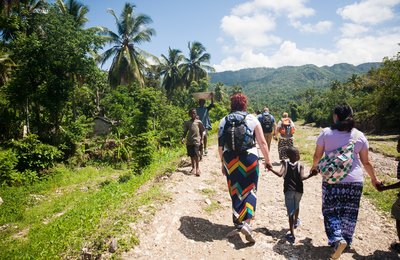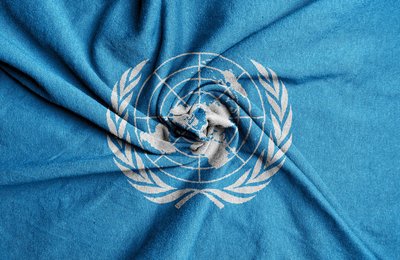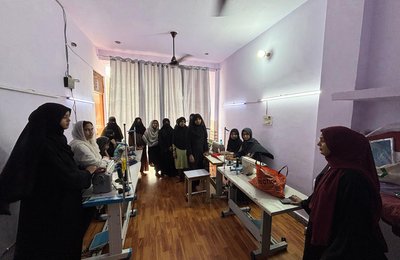Research this month
Critical choices: assessing the effects of education and civic engagement on Somali youths’ propensity towards violence
By increasing young people’s concern about future employment prospects and their dissatisfaction with government’s provision of education, schooling does not relieve youths’ frustrations; rather it can compound them.
Critical choices, from Mercy Corps, looks at how a programme in Somalia that provided young people with education and civic engagement affected participation in violent extremism. The report challenges some widely-held assumptions, for example, finding that more education led to greater support for political violence.
The role of personal relationships in peacebuilding interventions
For many peacebuilders, information diversity combined with relevant and credible insider information acquired through local social capital is the basis for their understanding of the conflicts and their dynamics, which shapes the way they act in the given context.
The role of personal relationships in peacebuilding interventions, from swisspeace, analyses the importance of social capital and personal relationships in building peace. Among other aspects, the research explores the difference between local and international interventions, finding that although local peacebuilders tend to have greater levels of social capital they face more constraints on how it is used.
Islamist groups in Afghanistan and the strategic choice of violence
Islamist groups behave much like all other social movement organizations when making strategic choices to contest the power of the state. The decision to use violence is most often the result of rational cost-benefit calculations rather than ideological fanaticism.
Islamist groups in Afghanistan and the strategic choice of violence, from USIP, seeks to understand why Islamist groups turn to violence in Afghanistan. The report argues that use of violence is rarely driven by ideology, but by a rational assessment of available methods of achieving political goals. As such there are important implications for building peace with such groups.
Community workers’ guide to understanding gender-based violence and child protection basic concepts
The manual is designed to strengthen key skills in safe identification and referral of GBV survivors and child protection as well as basic skills and core guiding principles for primary psychosocial support.
Community workers’ guide to understanding gender-based violence and child protection basic concepts, from United Nations Relief and Works Agency (UNRWA), is a training manual intended to provide practitioners with a deeper understanding of gender-based violence and child production in fragile environments. The manual looks at both theory and practical application, with particular attention given to community-based programmes.
Instruments in both peace and war: South Sudanese discuss civil society actors and their role
"The core work of these civil society actors has changed over time due to the ongoing insecurity and political differences, which have really brought divisions along tribal lines"
Instruments in both peace and war, from the Rift Valley Institute, presents the proceedings of a series of public consultations in Juba to understand the role of civil society and its role in peace and conflict in South Sudan. The discussions reveal the complex, and sometimes conflicting, influence civil society can have in the country.
From the blog
No justice, no peace without local organisations: lessons from the first African Truth and Reconciliation Commission Conference
 By Jean de Dieu Basabose: Truth and Reconciliation Commissions have an increasingly important role in securing peace across many African countries. Jean de Dieu Basabose draws out insights from a gathering of practitioners, academics and policymakers and asks: what part can local organisations play in transitional justice? Read more »
By Jean de Dieu Basabose: Truth and Reconciliation Commissions have an increasingly important role in securing peace across many African countries. Jean de Dieu Basabose draws out insights from a gathering of practitioners, academics and policymakers and asks: what part can local organisations play in transitional justice? Read more »Building peace through border control in Puntland, Somalia
 By Osman Nur: In response to escalating regional violence, the Puntland administration has tightened its borders and imposed a ban on trucks. What does this mean for the local economy? What does this mean for peace and stability in northern Somalia? Osman Nur explores. Read more »
By Osman Nur: In response to escalating regional violence, the Puntland administration has tightened its borders and imposed a ban on trucks. What does this mean for the local economy? What does this mean for peace and stability in northern Somalia? Osman Nur explores. Read more »Cote d'Ivoire youth find political voice through storytelling
 By Virginie Ladisch and Joanna Rice: Virginie Ladisch and Joanna Rice look at the work of youth organisations building trust in society in Cote d'Ivoire. Read more »
By Virginie Ladisch and Joanna Rice: Virginie Ladisch and Joanna Rice look at the work of youth organisations building trust in society in Cote d'Ivoire. Read more »Trump in the White House: where next for the President and peacebuilding?
 By Kevin McCann: Donald Trump has been elected as the new American president. Before the results came in, we asked our Local Peacebuilding Experts what they wanted to see from the incoming administration. Read more »
By Kevin McCann: Donald Trump has been elected as the new American president. Before the results came in, we asked our Local Peacebuilding Experts what they wanted to see from the incoming administration. Read more »Doors of dialogue and windows of mind: conflict and deadlock in Kashmir - part two
 By Ashima Kaul: More than three months since violence broke out in Kashmir over the death of militant leader Burhan Wani, the situation remains grim. Schools are shut, hundreds have been arrested and the government response has increased feelings of separation and anger. Read more »
By Ashima Kaul: More than three months since violence broke out in Kashmir over the death of militant leader Burhan Wani, the situation remains grim. Schools are shut, hundreds have been arrested and the government response has increased feelings of separation and anger. Read more »A pillar of prevention: the role of civil society in atrocity prevention
 By Bridget Moix: A new report released this week in Washington, DC, affirms the critical role that local civil society plays in helping prevent, respond, and recover from mass violence. It urges the next US President and Congress to increase support for their efforts. Read more »
By Bridget Moix: A new report released this week in Washington, DC, affirms the critical role that local civil society plays in helping prevent, respond, and recover from mass violence. It urges the next US President and Congress to increase support for their efforts. Read more »






